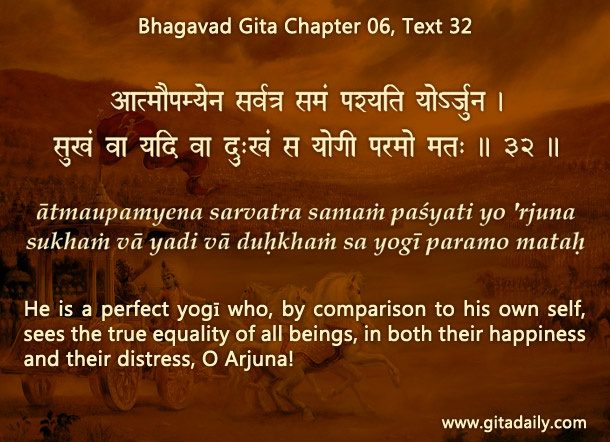We all probably know some people who bore us to death. Nothing they say or do interests us – and they keep saying and doing the same uninteresting things repeatedly. Such feelings are understandable because we all are individuals with our particular interests; naturally, some people interest us more than others. Still, we all are sometimes obliged to deal with uninteresting people.
To make such interactions more interesting, we can cultivate a learning mood by asking ourselves a bold, counter-intuitive question: Rather than people being boring, might we be boring? Boring in the sense that our scope of interests is too narrow.
Helping us expand our range of interests, Gita wisdom explains that we all are souls on a multi-life journey of spiritual evolution. Such evolution centers on growth in our capacity to learn and to love, till we ultimately learn to love the all-attractive supreme, Krishna. The Bhagavad-gita (06.32) indicates that advanced spiritualists see how everyone is on a shared journey of spiritual evolution. In that journey, all our joys and sorrows are meant to further our evolution.
If we too strive to see others spiritually, we expand the scope of our interests – rather than treating people as boring because they don’t provide us any material gratification, we can see them as interesting because they can help us learn things that further our spiritual evolution. No matter how boring their lives seem to be, they have had some experiences different from us. And understanding those experiences can teach us something valuable for our evolution, even if they had no intention of teaching that or even if they themselves had not learned that lesson from their own experience.
Thus, we can go beyond blaming others for being boring to taking responsibility for making our life interesting.
Think it over:
- When we find others boring, how might we ourselves be boring?
- How does Gita wisdom expand our range of interests?
- How can focusing on spiritual evolution make our boring interactions interesting?
***
06.32 He is a perfect yogi who, by comparison to his own self, sees the true equality of all beings, in both their happiness and their distress, O Arjuna!
To know more about this verse, please click on the image
Explanation of article:
Podcast:


Leave A Comment